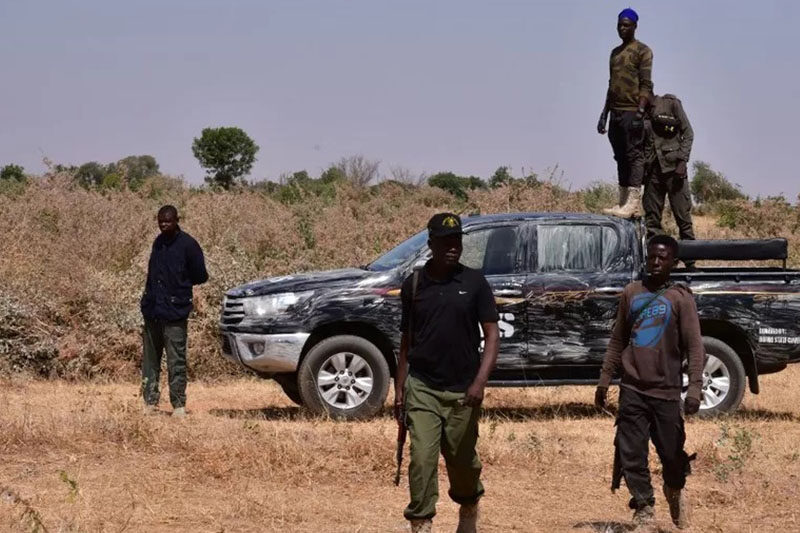Soldiers and other security operatives on the frontline fighting insurgents in forests and remote villages are in a financial pickle – they are struggling to swap their old notes for the redesigned ₦1,000, ₦500 and ₦200 notes and are finding it virtually impossible to get their hands on the scarce new currency.
Ali Ndume, the chairman of the senate committee on army, said the redesign of the naira notes and the rushed implementation of the cashless policy by the Central Bank of Nigeria (CBN) was having a negative effect on the operations of Nigerian troops.
He told journalists at a press briefing in Maiduguri that many of the troops were stationed in areas where there were no banking facilities and, if they did manage to access automated teller machines (ATMs), they had to stand in long queues and deal with crowds of people and they did not have time to spare waiting in line.
Not only were troops finding it difficult to swap the old notes for the new notes, but the scarcity of the new currency also meant they did not have money to buy food and other essentials.
Ndume asked the CBN to ensure that the needed cash was supplied to military personnel and other security agents.
Although he was not against the new monetary policy, he said he was concerned about the scarcity of the new notes and worried about the hardships being experienced by all Nigerians, particularly the troops in far-off, remote places.
“Any government policy in conflict with the interest of the people is illegal,” he told journalists.
Ndume called on the federal government to provide the needed technological infrastructure to fast-track the cashless policy.
Major-General Babagana Monguno, the national security adviser, called on the Nigerian House of Representatives to find solutions to the economic crisis arising from the scarcity of the redesigned naira notes, saying soldiers on the frontline in the fight against the insurgency, banditry and other violent crimes were facing financial difficulties.
Baba Shehu Abdulganihu, the overall commander of sector 4 of the Civilian Joint Task Force (CJTF) in Maiduguri, told RNI that the Nigerian Army and members of the CJTF were citizens of Nigeria and were fighting the war to protect the lives and property of all citizenry but, like most of the population, they were seriously affected by the cash-swap policy and the shortage of the new naira notes.
He said even if the soldiers secured a pass from service and were able to get to banking facilities, they did not have enough time because of the crowds and long queues.
The scarcity of the new notes was making it extremely difficult for security operatives to buy necessities and they were suffering financially, he said.
“If they are able to access an ATM they do not have enough time to complete transactions because they are hampered by the crowds and the long queues. Before, troops from the frontline would come into town regularly to buy whatever they needed but now they cannot do that because they cannot get their hands on the scarce new naira notes.”
Abdulganihu said the Borno State government had tried to swap the old notes the soldiers had in their possession at various places in local government areas but the scarcity of the new notes was making it impossible to swap all the old notes.
“We appreciate the state’s efforts but we are appealing to both the federal and state governments to allow the troops more time to swap their old notes. They are not in the same position as ordinary people who have better access to banks. There must be measures put in place to allow frontline troops to swap their old naira notes when they can. They should not have to keep to the deadline set by the government and the CBN. The CBN must address the plight of the security operatives who are fighting criminals and insurgents not only in Borno State but also throughout Nigeria.”
Umar Sanda, a public affairs commentator and a security analyst in Maiduguri, said: “The new naira notes and the implementation of cashless transactions have affected the frontline troops in many ways. Soldiers and members of the Multinational Joint Task Force [MNJTF] and the CJTF and other security operatives who are battling with Boko Haram [Jamā’at Ahl as-Sunnah lid-Da’way Wa’l-Jihād – JAS] insurgents in the forest are experiencing serious hardships and challenges. Just like everyone else, they need to buy food and other essentials for themselves and for their families.
“Our frontline troops cannot conduct cashless transactions. There are no stable networks in the forest. It is imperative that the government finds a solution to help our troops even if it means representatives are sent to the frontline so that the troops can swap their old notes for the new ones there. The government needs to address the challenges and hardships faced by frontline troops.
“The war against the insurgency is almost at an end and the Nigerian troops and other security operatives are trying their best to stop the insurgency. It is the right time for the government to support the frontline troops fully by making an exception for the troops so that counterinsurgency operations will not be negatively affected.”
HETTIMA LAWAN MONGUNO








